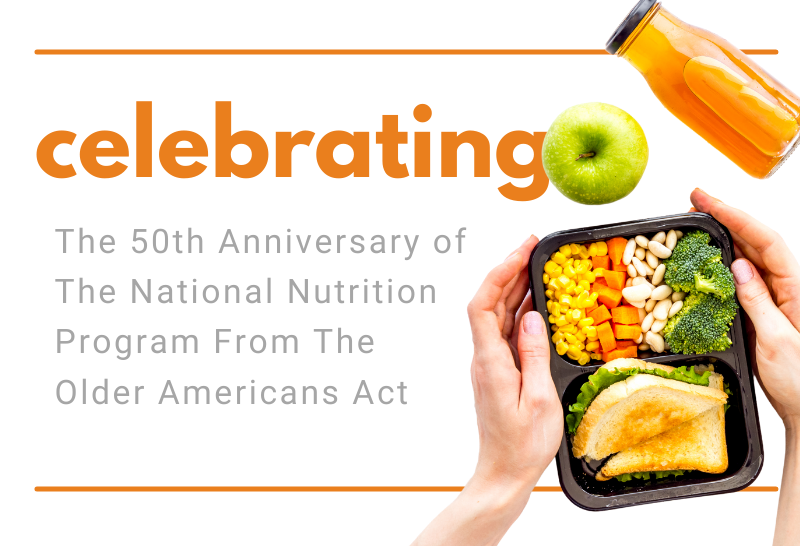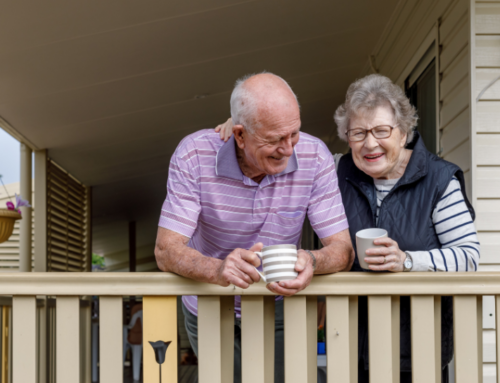Celebrating The 50th Anniversary of The National Nutrition Program From The Older Americans Act
There are two problems for senior Americans today that we as a community can change due to The Older Americans Act (OAA). 5.2 million seniors in America over 60 faced hunger in 2019. 25% of seniors over 65 are considered socially isolated.
In 1972 there was an amendment to The Older Americans Act of 1965 that established The National Nutrition Program for older adults. This created more opportunities for change.
As we’re celebrating the 50th Anniversary of The National Nutrition Program, we celebrate the impact of this program on seniors today.
Why We Need The National Nutrition Program
Many older Americans lose independence as they age. They may not be able to chop vegetables or drive to the grocery store. This is a big change that could lead to unhealthy eating without support from their community.
The National Nutrition Program provides grants to states so they can fund nutrition services like the ones we provide at DSCC. These services give seniors access to nutritious foods that improve their mental and emotional health. They need this support as their life changes with age.
Many nutrition programs and food delivery services connect seniors with other resources that improve their health. An active lifestyle and social events combat social isolation. Social isolation increases a person’s risk of premature death.
Our seniors may have found DSCC through our meal service but we provide these other services as well:
- well-being checks
- minor home repairs
- health and wellness education
- friendly phone calls
- yard clean-ups
- intergenerational activities
Food is a great connector. Everyone knows they need food. Nutrition programs are often the gateway to more community support.
Who It Helps
In recent years, the number of homebound older Americans doubled. These seniors rely on others to support them in order to stay in their homes. Through the programs The National Nutrition Program funds, Americans over 60 can maintain as much independence as possible. Many people don’t need to move to an assisted living facility if they receive enough support while living in their own homes.
Programs under OAA serve seniors who are more likely to be rural, live alone, and on average have less income and education. They’re less healthy than the people in the general population over 60 years old. These are the people who need our support.
How Federal Programs Reach Local Communities
Federal funds come from the U.S. Department of Health & Human Services and are made possible by the Older Americans Act (OAA), passed into Law in 1965. These Federal funds are passed on to States through the Administration on Community Living (ACL) and then awarded to local organizations through a grant process. This is where DSCC gets funded.
The OAA creates space for federal funds to be given to communities for nutrition programs for seniors. DSCC relies on these funds to keep our programs growing and to serve more people.
Programs That Partner With DSCC
There are many large programs across America fueled by the OAA. Together, these programs make an even greater impact on community-based programs.
DSCC is a Meals on Wheels America member. Meals on Wheels provides funding, education, leadership, research, and support to over 5,000 community-based programs.
We’re also a member of The National Association of Nutrition and Aging Services Programs (NANASP). A program that serves over 4 million older adults annually. We’re proud to be a part of these programs to provide support to our local seniors.
Together we’re recognizing the 50th Anniversary. We hope to gain further support to provide services to seniors to bring them independence, health, and happiness.
More Articles That Might Interest You
8 Great Benefits of Volunteering
8 Great Benefits of Volunteering Volunteering has enormous benefits for participants, those they help, and even on society [...]
Senior Isolation – A Silent Problem
Senior Isolation - A Silent Problem Unless you have a parent who is over 65, are an older [...]
COVID-19 and What It Means To Older Adults
COVID-19 and What It Means To Older Adults Last week the COVID-19 virus became a pandemic, then on [...]










